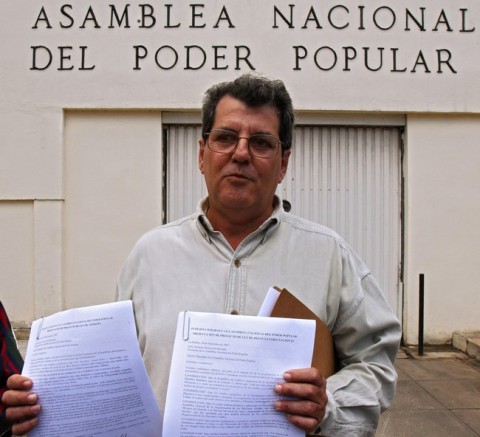
Here’s something I wrote back in 2003:
Here’s when I’ll believe that most of the Western Left has finally wised up (or grown up):
–When Oswaldo Paya’s picture replaces Che Guevara’s on hundreds of thousands of t-shirts.
–When filmmakers like Oliver Stone make positive documentaries about Oswaldo Paya instead of Fidel Castro.
–When leftist publications and organizations demand that Oswaldo Paya receive this year’s Nobel Peace Prize, or alternatively, that Yasser Arafat’s richly undeserved Peace Prize be revoked and given to Paya instead.
Oswaldo Paya died Sunday in a car crash in eastern Cuba. He was 60.
Mr. Payá, an engineer with strong Roman Catholic convictions, rose to prominence just over a decade ago as the main organizer of the Varela Project, a petition drive calling for a referendum to guarantee freedom of speech and assembly and other human rights.
When he began collecting signatures in the late 1990s, Cuba’s domestic opposition movement was virtually invisible. The Castro government had kept the ranks of dissidents small by pressuring and isolating them and describing them as little more than mercenaries paid to be mouthpieces for conservative Cuban exiles in the United States. Many Cubans in Havana at the time expressed skepticism about the dissidents’ intentions.
But Mr. Payá created a new model with his humility, his public rejection of both American aid and the American trade embargo, and his effort to draw Cubans into the movement.
….
His petition drive ultimately failed. After he delivered 11,020 signatures in May 2002 (he delivered 14,000 more later), the Cuban government began its own referendum, which made the island’s socialist system “irrevocable.”And after many of Mr. Payá’s allies were arrested in 2003 in a crackdown that sent dozens of dissidents, writers and librarians to prison, he and his Christian Liberation Movement began to fade from international view. A new generation of dissidents arose to grab the spotlight, including the wives of the arrested political prisoners and young bloggers like Yoani Sánchez.
But the younger activists have continued to hold him in great respect, and many are grief-stricken.
“A faultless man just died,” Ms. Sánchez wrote on Twitter on Sunday night, adding, “We have become even more orphaned.”
You should read Yoani’s full tribute to Paya here.
While the Cuban regime’s “line” on Paya (eagerly accepted by its Western apologists) was that he was a dupe of Yankee imperialism and anti-Castro Cuban exiles, the truth about him was quite different. Duncan Campbell of The Guardian interviewed Paya in 2006:
Paya denies that he is paid for by the US and says that, in fact, he disagrees with the main US tactics of blockade and possible military intervention. He has produced what amounts to a lengthy manifesto which deals with everything from health and education to property ownership and sport.
“You may ask why such a large programme, but it is because in a totalitarian dictatorship all aspects of life are controlled. People fear the regime and they fear change and what is going to happen to their houses and their jobs. For the first time in Cuba and maybe in Latin America, there is a civil conversation where the citizens are the main actors.
“To avoid chaos we need a programme – in Cuba, by Cubans for Cubans. We were developing this national dialogue when the US announced their programme for change and we said the programme has to be by Cubans and not the US. The EU and the US can help but the changes have to be defined by Cubans.”
Paya said that “the hardliners in Miami, who don’t represent most of the exiles now, they don’t want to publish what we have to say either. There is a boycott of us there, too.” He said that some of the hardline exiles were angry that the project was not in favour of reacquisition of all the property left behind when the exiles left.
“We don’t want a grand privatisation like in Russia,” he said. “We don’t want the poor becoming poorer and a nomenklatura in power. We want to keep the health service free and education free. This programme destroys the myth that we have to choose between socialism and freedom.”
I stand by every word I wrote in 2003.